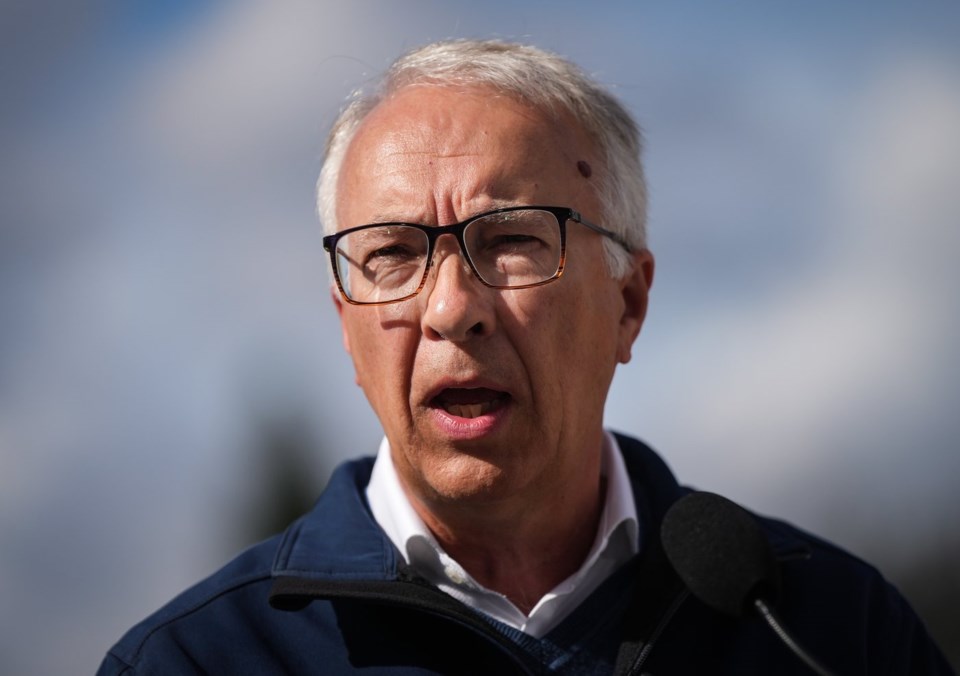The federal government has been "absent" and failing to live up to commitments to First Nations on housing and clean water, and a B.C. Conservative government would fix the problems, then send Ottawa the bill, Leader John Rustad said Monday.
Rustad said if his party wins the Oct. 19 provincial election, B.C. would partner with First Nations and "unleash the potential" for prosperity through mining, forestry and other resource projects.
He has previously pledged to repeal B.C. legislation adopting the United Nations Declaration on the Rights of Indigenous Peoples, and his party said in a release it would instead honour the declaration "as it was intended," with laws advancing economic reconciliation and Indigenous autonomy.
All three party leaders turned their attention to First Nations on Monday on the National Day for Truth and Reconciliation.
NDP Leader David Eby took his family, all dressed in orange, to an Orange Shirt Day ceremony at the University of B.C.
Green Leader Sonia Furstenau said during a news conference that B.C. had been a leader recognizing Indigenous rights, while she warned that some want to "undo that progress and go back to a paternalistic relationship" with First Nations.
Rustad, speaking in Cultus Lake, B.C., repeated that his government would uphold the United Nations Declaration on the Rights of Indigenous Peoples "the way it was intended."
The party has previously said the declaration should not be "an obstacle to development, but as a guiding principle for recognizing Indigenous rights and aspirations."
He said the provincial legislation had created "friction" and his government would remove and replace laws that get in the way of full economic reconciliation.
Grand Chief Stewart Phillip with the Union of British Columbia Indian Chiefs said in a post on X, formerly Twitter, that Rustad's remarks on Truth and Reconciliation Day were "astonishingly reprehensible."
In an interview, Phillip said "We find it to be very counterproductive, very negative and quite frankly racist to make such an announcement, such an ambiguous announcement on Reconciliation Day."
"We felt compelled to respond," Phillip said.
The work that went into passing the declaration, he said, "would be obliterated and we go back to conflict and confrontation."
He said First Nations would return to the barricades to defend their lands from logging, mining, and oil and gas production.
"The acceleration of industrialized destruction of our homelands, our territories, is nothing to cheer about," he said. "It's not economic reconciliation. It's economic exploitation."
Phillip is the husband of Joan Phillip, the NDP’s candidate in 91ԭ��-Mount Pleasant.
Rustad said a Conservative government would create a loan guarantee program for First Nations to allow full participation in large forestry projects.
He said he's committed to returning 20 per cent of the province's forestry volume to First Nations, who would be "landlords of that land" and reap the benefits rather than governments getting stumpage fees with only a fraction going to First Nations.
Furstenau, who was in Victoria, said governments need to abandon the past of "transactional approaches" with First Nations that have been "used to dispossess Indigenous peoples of land, culture and language, and move to relationships that are rooted in recognition of Aboriginal rights and title."
In a statement Monday, the Greens said "we understand the discomfort that some British Columbians feel about our history, but there is no moral path for the continued denial of Aboriginal rights and title, it is a socially reprehensible and legally fraught position.
"We cannot escape our history. We must confront it, and we must reconcile it," the statement said.
Eby sat in the front row with his family at the Orange Shirt Day event at UBC, while listening to Indigenous people relay their experiences about attending residential schools or other hardships they went through under colonial rule. He didn't speak during the event.
Rustad, wearing an orange shirt pin on his lapel, was accompanied at Cultus Lake by Sq'ewlets First Nation Chief Joseph Chapman and Indigenous candidates Chris Sankey and A'aliya Warbus,
Nominations for the election officially closed on Saturday, and with their teams of candidates in place, leaders are looking ahead to their televised debate.
The Oct. 8 debate will be one of the few occasions B.C. voters will see the leaders of the New Democrats, B.C. Conservatives and the Greens face each other during the campaign.
Eby and Rustad spent the first week of the campaign taking verbal personal swings at each other and criticizing their policies.
Eby said Rustad's "conspiracy theory" anti-vaccine position could end up hurting people and the health care system, while Rustad said the NDP leader was damaging the province with weak leadership and left-wing viewpoints.
Elections BC said its final list of nominated candidates for the vote includes 93 from the NDP, 93 from the B.C. Conservatives, 69 from the Greens and 40 Independents.
The list from Elections BC does not contain any official Opposition BC United candidates but does include five Freedom Party of B.C. hopefuls, four Libertarians, three representing the Communist Party of B.C. and two candidates from the Christian Heritage Party of B.C.
— With files from Brenna Owen and Chuck Chiang
This report by The 91ԭ�� Press was first published Sept. 30, 2024.
Darryl Greer, The 91ԭ�� Press



